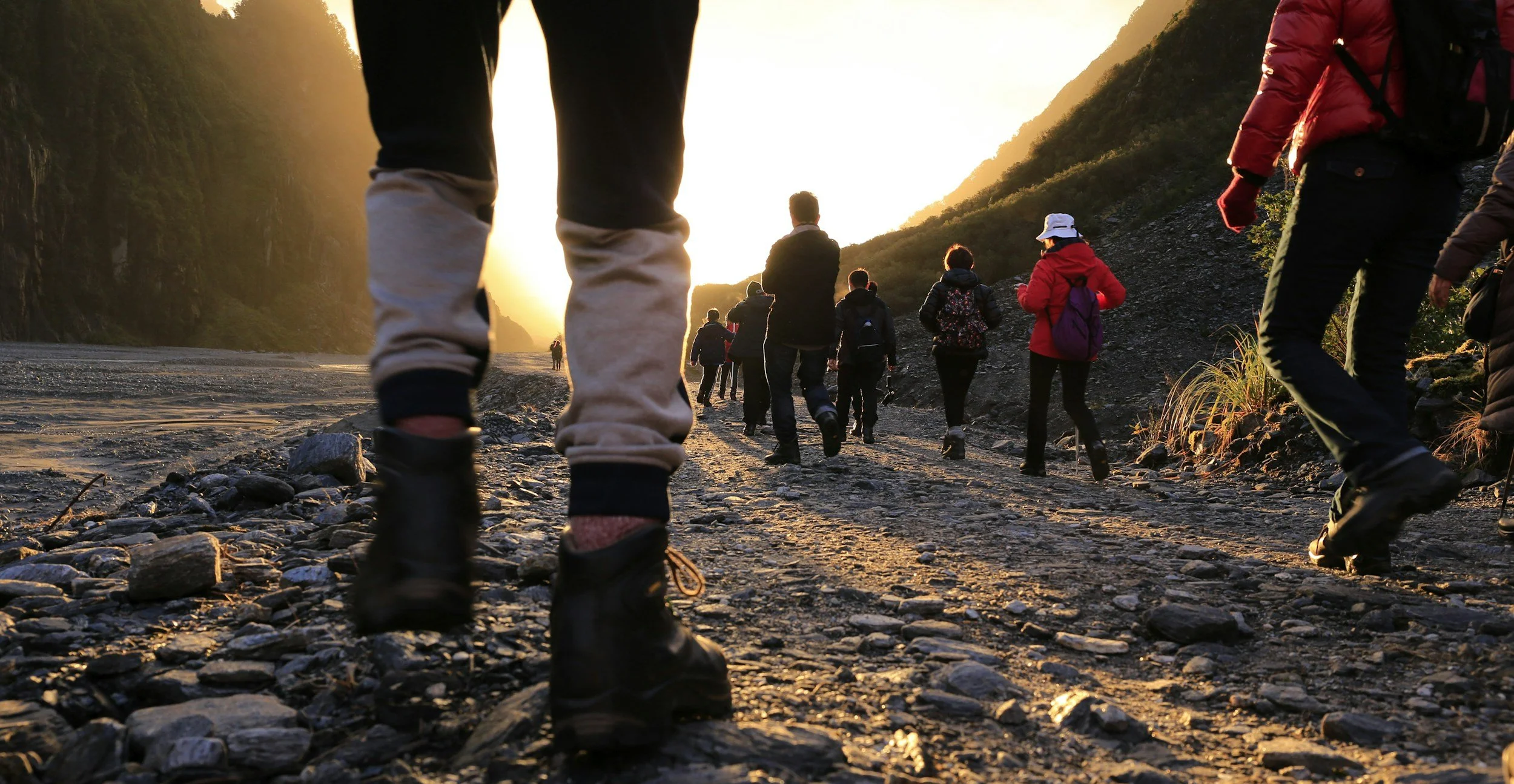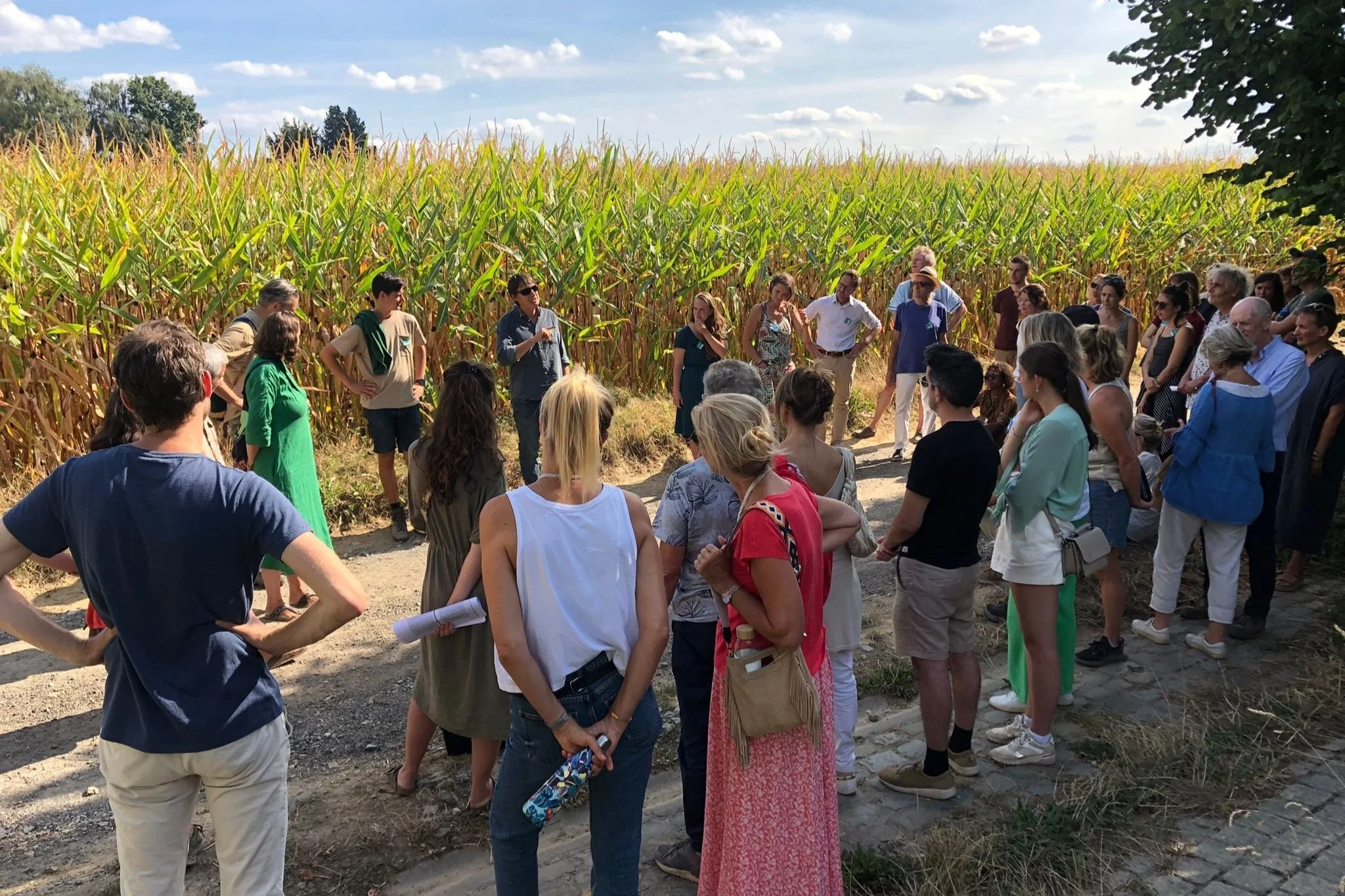Training journey: walking to transform the way we work, learn and collaborate
March - September 2026
Walking as a professional practice
What if walking became a true professional practice, transforming the way we work, collaborate, and think together? A powerful resource to support learning, develop leadership, spark generative innovation, foster authentic relationships, resilience, and collective commitment to act together.
In this spirit, The Schumacher Sprouts are proud to launch a walking‑facilitator learning path alongside experienced trainers who help professionals design and lead structured walks to deepen connections with self, others and nature.
Join our learning and practice community, where together we will reinvent transformative spaces and bring the power of walking in nature into our professional practices.
“All truly great thoughts are conceived while walking”
— Friedrich Nietzsche
Why this training?
In a world marked by rapid change and growing complexity, organizations and communities are being called to respond in new ways—more creatively, more collaboratively, and with a renewed sense of connection to one another and to the Earth.
Among the most natural — yet often overlooked — practices that can support this shift is walking.
Rooted in our evolutionary biology and long practiced by visionary thinkers—Socrates, Gandhi, Alexandra David-Néel, Darwin, and Einstein —walking has been a gateway to deep thought and fresh insight. Today, neuroscience confirms its benefits: not only for physical well-being, but also for cognitive performance, creativity, and emotional regulation.
But beyond the individual, the power of collective walking remains largely untapped. When we walk—alone or with others, especially in nature—we enter into a state of mind particularly suited to deal with complexity.
When guided with intention, walking has the potential to:
stimulate emotional and intuitive intelligence, connect to our hearts — essential for navigating uncertainty;
build mental agility and foster adaptive responses by loosening attachment to fixed perspectives or rigid frameworks with the support of nature;
foster genuine dialogue and deeper human connection, enabling people to speak their truth in a safe atmosphere, and to become more cohesive and resilient;
engage the full body–mind intelligence — not just the intellect — supporting the capacity to hold contradictions, tensions, and uncertainties without needing to resolve them immediately.
In this sense, walking is not time off—it’s a different, smarter way to work and to learn together.
What types of facilitated walks?
Facilitated walks can be tailored to different experiences, from short session (1h/2h) to full day seminars or even mutli-day, and seamlessly integrated into work or learning programmes, either as brief activities or as a central approach.
In practice, a team or group can walk to strengthen team spirit, reflect on key projects or challenges, brainstorm for innovation, or gain new insights. Walking can also help teams or collectives share findings, develop a common vision, or simply step back from daily pressures to nurture cohesion and trust over time. Walking can also be integrated at universities as a moment for course revision, project preparation, or evaluation.
Examples include: senior leaders and change leaders walking to reflect on their mission, inter-institutional teams walking to create alliances, lunchtime walks, and theme-based walks (e.g., climate action, purpose, social justice, burnout,…).
-
This learning journey will help you grow as a facilitator of walking activities and other types of group processes. You will deepen your skills and practice through:
discovering more of yourself as a facilitator, often in unexpected ways: your sense of purpose, strengths and resources, limits and development areas;
learning how to design and facilitate walking sessions: from the initial intent to structuring the walk and transitions;
experiencing a wide variety of facilitation tools, path ad places that can be used for walks, responding to various situations and needs of team and groups;
better understanding how walking in nature is key to sustainable balance, collective intelligence and better quality of thinking and decisions;
join a learning community of learning and practice.
-
This training is made for you if you are:
leading a team (leaders, managers, coordinators, independent entrepreneurs, etc.) with the mindset, commitment and aspiration to shift the status quo;
a facilitator or a person involved in knowledge transmission (teachers, trainers, coaches, etc.) wanting to integrate walking as a tool for learning and transformation, and who values reconnecting with nature;
a change-maker responsible for designing transformative processes and daring to step out of your comfort zone to explore new ways forward.
-
This training is based on a pedagogical approach developed by trainers within the European School of Administration, which is responsible for providing high quality training to staff across all EU institutions and agencies. It has been offered since 2019. It is enriched by multiple approaches, including:
The Outdoor University approach and the “Head-Heart-Hands” pedagogy from Schumacher College (UK) emphasizing holistic learning
Collaborative facilitation methods that foster collective intelligence and learning ( derived from Human Systems Dynamics, Theory U, The Work that reconnects, the Art of Hosting, 8 Shields)
The ethics of Deep Ecology, emphasizing a profound connection with the natural world
The training format
This 7-month blended learning programme provides the time and space needed to develop a range of complex skills through various activities:
Two online sessions
Four full-day learning walks on diverse terrains
Designing and leading practice walks
Reading, writing, and personal reflections
Engaging with a collaborative learning community
Key dates in 2026
Onboarding online session: March 12th (17h - 19h)
DAY 1 Experience Walk: March 21st
DAY 2 Experience Walk: April 17th
Online session: May 28th (17h-19h)
DAY 3 Practice walks: June 13th
DAY 4 Experience Walk: September 18th
Languages and accessibility
The program will be delivered mainly in French, with some English support available for participants who are not native French speakers (a good passive understanding of French is therefore required). The program requires you be able to walk for a full day and have a strong interest in learning outdoors.
The training will take place in Belgium, along various routes in the Brussels and Walloon regions.
Price
Standard rate - TREE: 1900€ (incl. VAT)
Reduced rate - SPROUT: 980€ (incl. VAT) Available for participants from the non-profit or education sectors or people with low income. (4 spots available).
Scholarships Available – SEED: If the above fees are a barrier to your participation, please contact us to apply for a scholarship (2 spots available).
How to apply?
Ready to take the leap and explore a new way of working?
Applications are now open for up to 12 participants.
Please fill out the application form — we’ll get back to you to confirm your registration.
If you’re eager to explore new ways of working, collaborating, and supporting transformation, join us for this immersive training!
Meet your trainers
Anne Lemaire
Developing leaders, organisations and teams is what has driven Anne Lemaire for more than 30 years. She has done this for 20 years within and for international companies in the IT/Telecom sector in 15 countries, as responsible for Learning & Development and as Head of HR Business Partners.
Since 2011, she has been working as an independent coach and facilitator on leadership development and organizational development with organizations such as Sioo, AMS, HEC Liège, EU institutions. Anne has a unique way to get people moving and approaches the learning process from a holistic perspective. She has a well-developed sense of listening, that helps her create the conditions to make exploration and learning possible.
Over the years, leadership development, systems thinking, meditation, walking, voice work and singing became intertwined in her consulting practice and in her leadership programmes. Anne's guidance is creative, patient and compassionate.
Nikita Stampa
With a bachelor's degree in philosophy and a master's in economics from UCLouvain, Nikita joined the European institutions over 20 years ago. He worked across various fields, including international trade and services, corporate social responsibility, and innovative public procurement.
In 2015, he undertook a pilgrimage of over 1,000 km across Italy. This transformative journey led him to leave his position as Head of Unit at the European Commission to join the European School of Administration, where he began designing and delivering innovative leadership development activities, focusing on meaning and collective intelligence. Following in the footsteps of the ancient Greeks, he introduced training programmes within the European institutions where walking—especially in nature—became the core pedagogical tool.
In 2023, he published an autobiographical account of his pilgrimage experience, "Tout ce qui vient à vous", with Walden & Whitman. Now retired from professional life, he is dedicated to sharing his life experience and preparing the organization of a Peace Pilgrimage.
Aurèle Destrée
Aurèle is the coordinator of the nonprofit Schumacher Sprouts, where she designs and facilitates a wide range of outdoor learning experiences in Belgium. Her work draws inspiration from the pioneering pedagogical approaches of Schumacher College (UK), with a strong focus on experiential, holistic, and nature-based education.
With a background as a European policy analyst, combined with hands-on experience in horticulture and as a nature guide, Aurèle bridges intellectual inquiry with embodied, grounded learning. She leads trainings on the Outdoor University approach and collaborative pedagogy in higher education, as well as 5-day itinerant seminars based on The Work that reconnects.
Passionate about Earth systems and ecological intelligence, she creates environments where participants can reconnect with nature and develop new competences.
Aurèle lives in the eco-village of L’Arbre qui pousse, where she co-develops its campus as an in-house learning center.
















